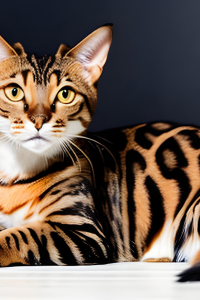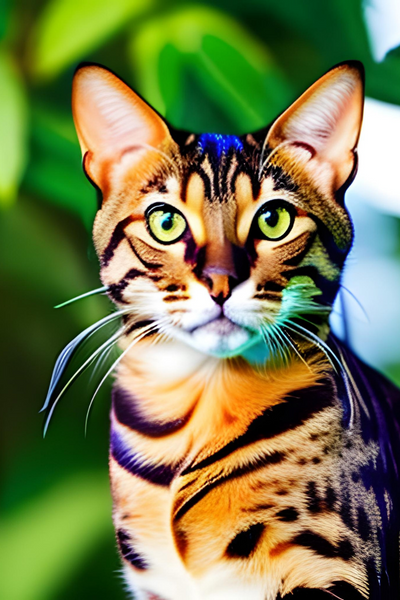Are Bengal Cats Hypoallergenic?
Are Bengal Cats Hypoallergenic? Bengal cats are a breed that has been growing in popularity over the past few years, thanks in part to their unique coat patterns and active personalities. However, for people who suffer from cat allergies, the question remains: are Bengal cats hypoallergenic? In this article, we will explore the answer to this question and provide some tips for those who want to live with a Bengal cat but have allergies.
What does hypoallergenic mean? Are Bengal Cats Hypoallergenic?
Before we dive into the topic of whether Bengal cats are hypoallergenic, it is important to define what we mean by this term. Hypoallergenic refers to a substance or product that is less likely to cause an allergic reaction. In the case of cats, a hypoallergenic breed is one that is less likely to produce an allergic reaction in people who are sensitive to cat allergens.
What causes cat allergies?
To understand whether Bengal cats are hypoallergenic, it is important to understand what causes cat allergies in the first place. Cat allergies are caused by a protein called Fel d 1, which is found in a cat’s saliva, urine, and dander (flakes of skin). When a cat grooms itself, the saliva dries on its fur and becomes airborne, along with the dander and urine particles. When people inhale these particles or come into contact with them, they can trigger an allergic reaction.
Are Bengal cats hypoallergenic?
The short answer is no, Bengal cats are not hypoallergenic. While some people may experience fewer allergy symptoms around Bengal cats compared to other breeds, there is no such thing as a completely hypoallergenic cat. All cats produce Fel d 1 protein to some extent, and as such, they all have the potential to cause an allergic reaction in sensitive individuals.
Factors that affect the hypoallergenic nature of Bengal cats
While Bengal cats are not hypoallergenic, there are some factors that may make them more tolerable for people with cat allergies. These include:
Coat type
Bengal cats have a short, dense coat that requires minimal grooming. Because they groom themselves less than other breeds, they may produce less dander and saliva, which could reduce the amount of allergens in the air.
Low-shedding
Bengal cats are known for being low-shedding, which means they produce less fur and dander. However, it is important to note that they still shed to some extent, and their allergen levels may vary depending on the individual cat.
Genetics
Some Bengal cats may produce lower levels of Fel d 1 protein than other cats. This could be due to genetic factors or breeding practices that select for cats with lower allergen levels. Are Bengal Cats Hypoallergenic
Personal sensitivity
Finally, it is worth noting that not all people are equally sensitive to cat allergens. Some people may be able to tolerate living with a Bengal cat, while others may experience severe allergy symptoms. It is important to consult with an allergist before bringing a cat into your home if you have allergies. Are Bengal Cats Hypoallergenic
Tips for living with a Bengal cat if you have allergies
If you have allergies but still want to live with a Bengal cat, there are some steps you can take to reduce your exposure to allergens. These include:
Keep your home clean
Regularly vacuuming, dusting, and cleaning. Are Bengal Cats Hypoallergenic
Use air purifiers
Air purifiers can help remove allergens from the air, including those produced by cats. Look for a purifier with a HEPA filter, which can capture particles as small as 0.3 microns.
Create a cat-free zone
Designate a specific area of your home as a cat-free zone, such as your bedroom. This can help reduce your exposure to allergens while you sleep.
Bathe your cat
While it is not necessary to bathe your Bengal cat frequently, giving them a bath once a month can help reduce the amount of dander and saliva on their coat.
Consider allergy shots
Allergy shots, also known as immunotherapy, can help desensitize your body to cat allergens over time. Talk to your doctor or allergist about whether this is a good option for you.

Common misconceptions about hypoallergenic cats
There are many misconceptions about hypoallergenic cats, including:
Hairless cats are hypoallergenic
While hairless cats like the Sphynx may produce less dander, they still produce saliva and urine that contain Fel d 1 protein. As such, they are not completely hypoallergenic.
Allergies are caused by cat hair
While cat hair can carry allergens, it is not the primary source of cat allergens. Fel d 1 protein is found in a cat’s saliva, urine, and dander, and can be present even in hairless breeds.
Hypoallergenic cats are completely allergy-free
No cat breed is completely allergy-free. While some breeds may produce fewer allergens than others, all cats produce some level of Fel d 1 protein.
Conclusion
While Bengal cats are not hypoallergenic, there are some factors that may make them more tolerable for people with cat allergies. By taking steps to reduce your exposure to allergens and consulting with an allergist, you may be able to live comfortably with a Bengal cat. Are Bengal Cats Hypoallergenic
FAQs
- Can Bengal cats cause severe allergy symptoms?
- It depends on the individual. Some people may be more sensitive to cat allergens than others.
- Do Bengal cats shed a lot?
- Bengal cats are known for being low-shedding, but they still produce some fur and dander.
- Can allergy shots help with cat allergies?
- Yes, allergy shots can help desensitize your body to cat allergens over time.
- Are hairless cats hypoallergenic?
- Hairless cats like the Sphynx may produce less dander, but they still produce saliva and urine that contain Fel d 1 protein. As such, they are not completely hypoallergenic.
- Should I consult with an allergist before getting a Bengal cat?
- If you have allergies, it is a good idea to consult with an allergist before bringing any cat breed into your home.
